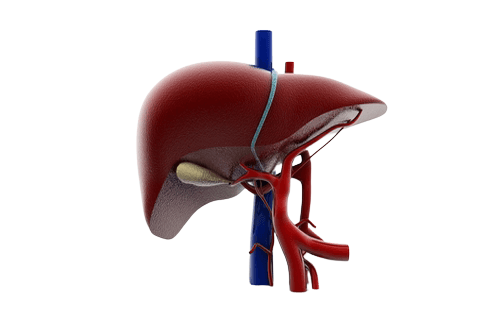Procedures
LIVER TRANSPLANTATION
With years of experience and over a thousand liver transplants under their belt, ILC has streamlined, individualized processes that takes the patient through all aspects from initial evaluation and listing to preparation for surgery. Our efficient yet amiable, empathetic transplant coordinators will be with you all the way in getting the necessary medical and administrative clearances in the shortest possible time.

OUR APPROACH
The hallmark of our Integrated Liver Care is our approach to patient care which includes your personally assigned transplant coordinator who helps you through every step of the process from your initial evaluation
AWARENESS
Liver transplant is a replacement of the diseased liver in a patient with end stage liver failure with a healthy organ. Living donor liver transplantation is a safe option with high success rates and is absolutely safe for donors.
TYPES OF TRANSPLANTS
There are five different types of transplants. Living Donor Liver Transplant, Deceased Donor Liver Transplant, Swap Liver Transplantation, Dual Organ Transplantation, kidney pancreas Transplant
INDICATIONS
FOR LIVER
TRANSPLANTATION
Liver disease can often be difficult to diagnose because its symptoms can be vague and easily confused with other health problems. In many cases, a person may have no symptoms at all but the liver may already have suffered significant damage.
LIVER TRANSPLANTATION
FOR CHILDREN
Learning your child may need a liver transplant can be overwhelming. Our Liver Transplant Program provides you and your child with exceptional care throughout the transplant process, from initial consultation to post-transplant monitoring.
PRE
LIVER
TRANSPLANT
After the failure of all the treatment for chronic liver disease, the referring Physician/Gastroenterologists will refer you to either Apollo Liver Clinics across various City or Apollo Hospital at our 3 Centre to undergo evaluation for Liver Transplant.
POST LIVER TRANSPLANT
Recovery from liver transplantation depends on many factors including the patient’s age, overall health, the severity of the liver disease, infections, secondary organ dysfunction or complications before or after the operation.
FACILITY
Integrated Liver Care has one of the largest and most comprehensive organ transplant programmes in India. The centre offers a host of state-of-the-art services which include transplants of liver, kidney and pancreas and transplant services.
TYPES OF LIVER
FAILURE
Liver failure is severe deterioration in liver function, It is caused by a disorder or substance that damages the liver. Most people have jaundice, feel tired and weak, and lose their appetite. there are two types, Acute and chronic liver failure
Frequently Asked Questions
- What are the symptoms of chronic liver disease?
- Is it treatable by medicines?
- Which are the common causes of chronic liver disease in India?
- When should one consult a transplant surgeon or a transplant centre?
- What are the tests needed to determine fitness for liver transplantation?
- What is the success rate of liver transplantation?
- Will transplant patients be able to lead a normal life after transplantation?
- What is the cost of a transplant operation?
- How is a liver obtained for transplantation?
- What is the alternative if there is no suitable living donor available?
- What is the risk involved to the donor?
The symptoms of liver disease are not specific. Early on, one may notice low energy levels, easy fatigability and poor appetite. But these symptoms are common in afflictions of several organ systems. The liver has a large reserve capacity. Till about 70% to 75% of this reserve is lost, there may not be any signs or symptoms.
Beyond this there may be fluid accumulation in the abdomen called ascites or swelling over dependant areas of the body like the legs.
• Bleeding into the gastrointestinal tract may manifest as vomiting of blood or passage of black, tarry stools called melena.
• Accumulation of toxic substances in the body normally filtered out by the liver particularly ammonia may lead to disruption of sleep pattern, forgetfulness, slowing or slurring of speech, inappropriate speech or even loss of consciousness in advanced cases.
• Jaundice in Chronic liver disease is generally a late feature and tends to be less severe except in certain variants of liver disease
Because over 70% to 75% of the liver is already damaged and replaced by scar tissue by the time signs and symptoms become evident, the process is not reversible by medication. In certain early cases, the process of further injury and scarring can be contained and rarely, even reversed by medication. In such cases the need for a liver transplant can be deferred or obviated. However, the treating doctor will decide whether you have such a condition and will monitor you during the treatment process.
Infection with Hepatitis B, Hepatitis C and alcohol are the common causes of liver disease in the adult population in our country. However, 1 in every 5 patients will have chronic liver disease where despite an extensive, no cause can be found. Infants and children present with chronic liver disease commonly due to congenital errors of metabolism.
As soon as one is diagnosed with chronic liver disease or develops symptoms related to liver failure as outlined above a visit to a transplant centre is desirable. They have experience in treating patients with liver failure and recommend liver transplant at the appropriate time. One of the common problems faced is late referral of patients, usually when all medical treatment has failed. In such a situation, they usually develop problems related to medication such as renal failure due to diuretic use or they are too sick to undergo the transplant procedure. One has to remember that the transplant operation itself is a major procedure and a certain minimum level of fitness is necessary to undergo a liver transplantation.
The work up is performed either as an outpatient or after admission. The process takes 4 to 5 days and investigations are performed in a staged manner. The first part of the testing determines the cause and severity of the liver disease and the second part is a detailed evaluation of other organ systems like the heart, lungs and the kidneys to rule out concomitant disease that may require correction prior to or even preclude transplantation in rare cases.
Liver transplant has an 86% to 92% success rate world wide. The outcome is directly related to the condition of the patient at the time of transplantation i.e. sicker patients tend to have poorer outcomes. With constant refinement of the process and a cumulative experience of over 1000 such procedures in our team, we have been able to achieve a success rate comparable to the best centers worldwide.
Yes, all patients return to their work after 12 weeks of discharge from the hospital depending on the nature of their work. People with office or desk jobs return to work earlier than those with physically demanding jobs. There is no restriction on routine activities like eating, exercise or sexual relations. All patients will have to take certain medicines that suppress the immune system and prevent rejection of the new liver for their lifetime. These medications will be reduced over time, especially after the first year. Especially during the first three months and to an extent during the first year patients are asked to avoid crowded places or proximity to patients with known infection like a cold. They are not required to wear masks at home or while going out after discharge.
The average cost of a liver transplant operation performed anywhere in India would be roughly Rs. 22-25,00,000 for an adult and 18-20,00,000 for a child. However, it would also depend on the nature of disease causing liver failure and the preoperative status of the patient. The cost remains the same whether a deceased or a living donor is used. This is a fraction of the cost at which liver transplant is performed anywhere across the world. Subsequently, the medication to prevent liver rejection costs between Rs. 8000 and 10,000 a month in the first year and between Rs. 6000 and 8000 thereafter.
Liver transplant can be performed either using a part of the liver from a living donor or from a brain dead cadaver whose family has consented to donate organs. In India, by law the living donor has to be related to the recipient family. The hospital and/or a state authorization committee who will verify documents and interview them in person to ensure that there is no coercion or trading involved will ascertain this. The advantage of a living donor liver transplant is that the operation can be planned and carried out after stabilizing and preparing the patient.
In case there is no donor from the family or a donor is found unsuitable for donation, a patient can list himself or herself for a cadaveric liver transplantation. This is a unique facility available at Apollo Chennai, which is the only centre in India performing both cadaveric as well as living donor liver transplantation. The patient will be put on a waiting list for their blood group after clearance as a transplant candidate. On receiving news of a suitable donor being available, the patient is called in for admission. The time available to reach the hospital is around 6 to 8 hours. Patients from out of station have to temporarily stay in Chennai till such time the transplant operation is completed.
Liver donation is a safe surgery; the worldwide reported mortality after donor surgery is 1 in every 200-300 such operations. Complications such as bleeding, infection and leakage of bile from the cut surface are low (about 10 to 12 in every 100 patients). Even on being given these figures, almost all donors still proceed with donation as it involves saving the life of a loved one. The donor is a healthy adult relative without any major systemic illness and a liver anatomy that is suitable for splitting. This is ensured by a detailed evaluation prior to accepting candidacy as a donor. There should be enough liver volume to meet the requirements of the recipient and ensure a safe remnant volume for the donor. A remnant volume of 30-35% is sufficient to meet the metabolic requirements of the donor in the postoperative period. In approximately 6 to 8 weeks time the liver regenerates to its original size both in the donor as well as the recipient. This regenerative capacity is unique to the liver allowing a part of the liver to be transplanted into another person. The recipient can be discharged from the hospital in about 6 to 7 days and can resume their day-to-day activities within a week. Depending on the nature of their work (desk job or physically demanding), they resume work by 6 to 8 weeks.




